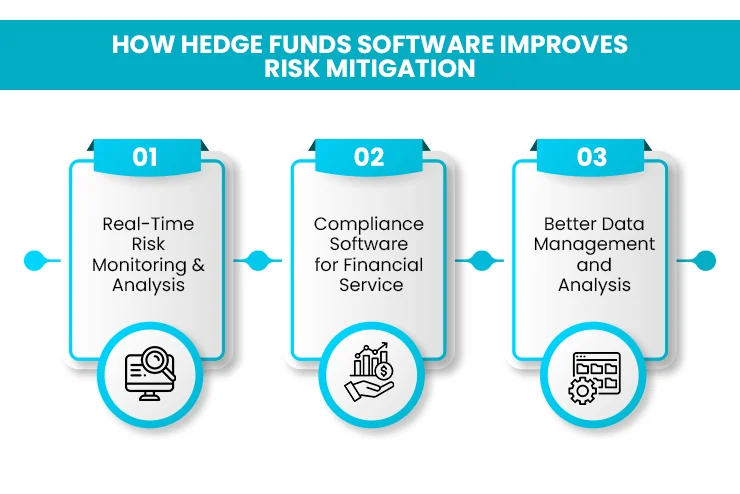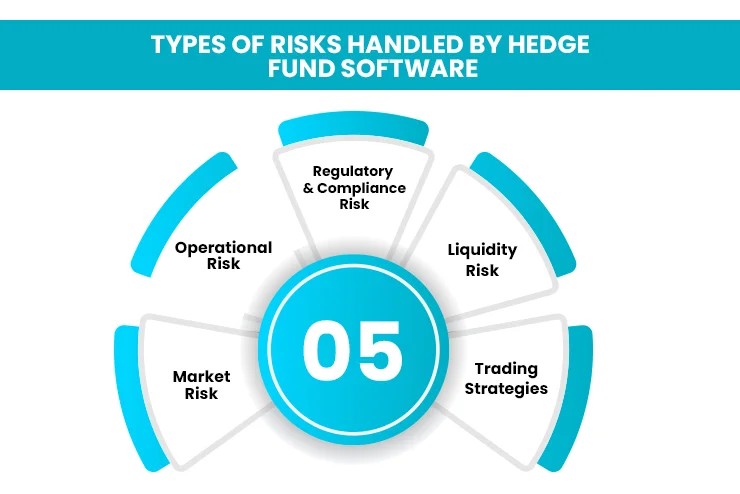Hedge funds have long been considered one of the more difficult instruments in the high-stakes world of finance. An ability to develop powerful returns brings with it a larger exposure to potential financial losses. Thus, hedge fund risk mitigation is an important part of their operations. Advanced hedge fund software has made risk mitigation easier, more precise, and proactive risks. These platforms help to manage risk and better returns for hedge funds, comply with tough regulatory standards and offer deep analytical insights that help make sound investment decisions.
Understanding the Landscape of Hedge Fund Risks.
Hedge funds face various risks that affect their performance and reputation. Examples include market, credit, liquidity, and operational risks. Excluding this, hedge funds face regulatory risks as countries develop new regulatory approaches for banks and other financial institutions. For example, compliance software for hedge funds allows them to maintain strict regulatory standards that underestimate the risk associated with legal exposures, an important factor in hedge fund risk mitigation.
Accordingly, hedge fund risk mitigation is not fixed but a living process that must always be analyzed, adapted, and enhanced. Hedge fund managers have discovered an orderly way to count, track, and manage risks based on data-driven insights, with greater support for software solutions, making hedge fund risk mitigation more efficient and powerful.
How Hedge Fund Software Supports Risk Mitigation
Hedge fund software uses data analytics, artificial intelligence (AI), machine learning (ML), and predictive analytics for risk management. These systems give a real-time view of market conditions, portfolio performance, and risk indicators, which are significant in hedge fund risk mitigation.
Some of the core areas where hedge fund software is contributing to risk mitigation include:
a. Real-Time Risk Monitoring and Analysis
Hedge funds require real-time monitoring; therefore, they track the dynamics of markets and regulatory changes. Fund software for hedge funds provides live feeds that are current in real-time to portfolio managers and analysts. It alerts immediately when responding to an event in the market. This is particularly important in high-speed trading and algorithmic trading. Trades happen in milliseconds from the point of execution.
An important aspect of risk management software in hedge funds is the availability of risk metrics that allow a risk analyst to monitor risk exposures at even granular levels. Such software allows managers to see their performance and how portfolio positions would change if selected market variables changed. Consequently, early warning signals can be detected much more effectively, and corrective action can be taken before risks materialize.
b. Compliance Software for Financial Services
What becomes more critical now about hedge funds is their growing compliance. This will keep running risks on their portfolio by following stipulated laws. Examples include the Dodd-Frank Act in the United States, MiFID II for Europe, and the Alternative Investment Fund Managers Directive in Europe. These requirements raise standards for compliance by hedge fund managers. Compliance software for financial services applied to the industry guides hedge funds to confirm effective compliance. It creates an opportunity to automatically track and report regulatory provisions, a key aspect of hedge fund risk mitigation.
Hedge fund compliance software automates and minimizes the human effort required in regulatory filings, record keeping, and reporting. These tools help track regulation changes and are also integral to risk mitigation, ensuring the hedge fund’s actions comply with the new standards. Other options include producing audit trails and easier compliance with audits and requests from regulatory agencies, adding further layers of hedge fund risk mitigation.
c. Better Data Management and Analysis
These funds use a lot of data for investments and risk management. This type of software aggregates information about the market, economic variables, and even social media sentiments to provide an encompassing view of the underlying risk factors. With modern tools of advanced data analytics, hedge funds can study correlations between risks and returns, discover underlying patterns, and unveil factors of hidden dangers.
Hedge fund software is a necessary element for hedge funds as it will help them appropriately assess the risks of market, credit, and operations. By centralizing and structuring data, hedge fund software provides better decision-making while also helping hedge funds tackle the risk that exists in data silos and fragmented data sources.

Types of Risks Handled by Hedge Fund Software
Hedge fund software controls various types of risks and is intended to have specific features that address certain risk types.
a. Market Risk
Another central risk the hedge fund encounters is market risk, a portfolio loss arising from price changes at the market level. Such software enables hedge fund portfolio managers to calculate the potential impacts of probable markets. Monte Carlo, for instance, can yield probable values of Value at Risk and stress testing whenever hedging funds are exposed to any form of probable fluctuation.
Market risk analysis tools allow for more effective position sizes and diversified strategies, where hedge funds can be adjusted according to the prevailing market conditions. Given real-time feedback about assessing and responding to market risks, hedge fund managers may make more discerning choices.
b. Operational Risk
Operational risk arises from internal factors, such as system failure, fraud, or human error. Hedge fund software can help decrease operational risk by streamlining internal processes and incorporating checks and balances within the system. Advanced software solutions often have ingrained risk control measures to reduce human error and prevent unauthorized trading.
Operational risk hedge funds are another type that can benefit from compliance software, as it confirms compliance with internal policies and regulatory standards. Therefore, effective operational risk management protects clients’ investments and reputations for hedge funds.
c. Liquidity Risk
Liquidity risk is the difficulty of converting assets into cash without loss in value. Hedge fund software monitors the liquidity of portfolio assets and calculates forecasts of the need for liquidity under various scenarios. In this manner, hedge funds can be assured of enough liquidity to meet their obligations even when the market becomes turbulent.
By managing the liquidity risk, hedge funds may avoid the sale of forced assets and prevent the possibility of a liquidity crunch. Also, monitoring liquidity helps identify which assets can quickly be liquidated, making decisions flexible during any market stress.
d. Regulatory and Compliance Risk
Hedge funds operate in a fairly heavily regulated environment, and non-compliance will result in extreme penalties. Compliance software for financial services and hedge funds allows these businesses to stay up-to-date about new rules and adopt new measures regarding compliance with the law.
As mentioned above, the software helps monitor regulatory requirements of various jurisdictions, automate workflows on compliance matters, and facilitate reports. Hence, hedge funds can spend more hours making decisions about investment strategies that comply with the system.

How Hedge Funds Employ Software in Predictive Analytics and Scenario Planning
Applying AI and ML to hedge fund software has improved predictive analytics capabilities a hundred-fold. Hedge funds can gauge and analyze past data and observe market trends and general economic indicators to identify market movement and risky outcomes. Predictive analytics facilitate hedge funds in effective market risk management; with the help of scenario planning, the same hedge funds are capable enough to face any adverse incident.
a. Stress Testing
Stress testing is a technique by which hedge funds can predict extreme market conditions, such as a financial crisis or market crash. Hedge fund software allows for the simulation of such scenarios using Monte Carlo simulation. This helps managers envisage potential impacts on their holdings and prepare beforehand.
b. Monte Carlo Simulations
The hedge fund software uses Monte Carlo simulation to evaluate the potential of various outputs in a very complex financial environment. This technique runs numerous simulations that yield possible returns, which have been computed for a range. Thus, a hedge fund manager has a probable scale for measuring risk against returns.
Risk Analyst Hedge Fund Function:
The risk analyst plays a critical role in the hedge fund industry, monitoring and assessing risks in multiple portfolios and asset classes. A risk analyst can analyze risk metrics, evaluate performance, and make data-driven recommendations for reducing exposure using hedge fund software.
Risk analysts further benefit from software tools that assemble data from different sources and merge them to provide one integrated risk profile. A merger, on the one hand, helps streamline all analysis and still provides an integrated view of the hedge fund’s risk exposure.
Hedge Funds: Risk and Return
Hedge funds are unique in creating returns that are bigger and better than comparable levels of risk. Once again, such software designed specifically for hedge funds works by preventing this risk from becoming a nuisance while managing it, so there is always a right blend of risk and return with no stability issue so far as superior performance is in question.
For investors wondering, “Are hedge funds high risk?” It is worth noting that they are inherently risky because of their leverage, short-selling, and high-frequency trading strategies. However, with advanced software tools, hedge funds can mitigate these risks while maximizing returns.
Resolver Software: Improving Incident Management, Risk, and Compliance
Incident Management Software
Purpose: Incident Management software from Resolver would help organizations proactively manage incidents, make data capture better and more efficient in operation, and add actionable insights.
Benefits: This would help the security teams identify patterns of potential threats before they become dangerous, depicting the security team’s efforts to add value to the organization.
Core Features include:
- Incident tracking.
- Real-time notifications.
- Data analytics for insights.
- Customizable reporting to support strategic decisions.
Enterprise Risk Management Software
Purpose: This software offers a strategic, top-down view of risks that could impact an organization’s long-term goals, giving a holistic approach to risk management.
Benefits: It gives an organization’s top leaders and boards a holistic view of its risks, allowing for proactive risk management. This results in an organization that is more resilient, adaptive, and responsive to potential problems.
Core Features: Risk assessment, heat mapping to visualize, key risk indicators (KRIs), and risk monitoring to help keep organizations aligned with their strategic objectives.
Regulatory Compliance Software
Purpose: The software of the Resolver’s compliance streamlines monitoring and managing regulatory activities. It helps track efforts toward compliance, assess the level of risk exposure, and focus resources on areas of concern.
Benefits: It saves time and effort regarding ensuring regulatory compliance while giving insights into areas related to compliance risk. This software keeps organizations abreast of regulatory changes in a highly regulated industry.
Core Features: It monitors compliance, tracks risk areas, automates workflows, and generates reports to facilitate decision-making while reducing the risks associated with regulatory violations.
Final thought
Hedge fund software is necessary to manage risk in today’s complex financial environment. Advanced-level predictive analysis, real-time monitoring, and compliance automation help hedge fund managers make decisions and limit exposure to all types of risks. Hedge funds: risk and return and other financial services ensure compliance with changing regulatory standards. The data management capabilities provide hedge funds with a proper basis for making decisions about investment risks.
With these software solutions, hedge funds navigate and mitigate risks effectively, balancing the risk and returning to their peak. Such technological advancement allows hedge funds to address risks in two dimensions: old risks and new risks, thereby making investors more confident and able to grow sustainably within the financial industry. Improving hedge fund risk mitigation through compliance software for financial services enhances hedge fund resiliency, allowing long-term stability as they respond to the new wave of regulatory changes.
.
FAQS
A hedge fund is a pooled investment fund whose primary objective is to maximize return on investment by minimizing risks related to capital loss. Hedge funds are typically accessible to accredited investors.
Hedge fund risk mitigation refers to practices and strategies for identifying, measuring, and managing potential risks in investment portfolios. Without such measures, capital would lose its way, as would investor confidence.
Yes, hedge fund software can help with regulatory compliance. It automates reporting and tracks regulation changes, guaranteeing compliance with the relevant law.
Integraåting compliance and risk management software for hedge fund managers can be done using platforms that offer single, unified dashboards from which they can monitor in real-time and report their compliance and risk metrics.
Hedge fund risk management software features include real-time risk assessment, compliance automation, data analytics, portfolio monitoring, and reporting tools.


